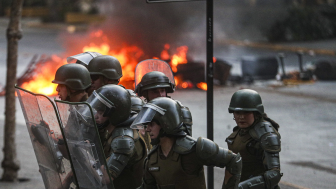Felipe Agüero
Former Fellow
Professional Affiliation
Professor of Political Science, Institute of Public Affairs, University of Chile
Expert Bio
Once I resumed my studies in sociology at the Universidad Católica in Santiago, Chile, (interrupted by the violent military coup of September 11, 1973), I began to focus on military participation in politics during the first half of the twentieth century. My goal was to understand the background to that unexpectedly violent military overthrow and its repressive aftermath. This work resulted in my degree thesis, completed in 1978, which later became part of a co-authored book on the Chilean military in democracy and authoritarianism. I continued the study of the military as a research associate in Flacso (Facultad Latinoamericana de Ciencias Sociales) in Santiago, until I left for Duke University in 1982 to work for a Ph.D. in political science. By then, the third wave of democratization begun in southern Europe was in full swing, and I became interested in the ways in which successful cases had dealt with the armed forces in order to assert democratic civilian control. During 1986-1987, with the support of the Social Science Research Council and the National Science Foundation, I researched the case of Spain, focusing on the post-Franquist period. My general concerns were the breakdown of democratic regimes and the factors influencing democratic transitions, with a particular attention to the role of the military. A named instructorship from Duke and a fellowship from the Kellogg Institute of the University of Notre Dame allowed me to write the dissertation. Later, taking a leave from Ohio State University and as a fellow at the Institute for Advanced Study in Princeton I expanded the comparative basis with cases in southern Europe and Latin America and turned that research into a book, which was published in 1995.I next returned to a more focused concern with Latin American democracies. With another leave the following year as a research associate at the North-South Center in Miami, I organized several workshops in Latin America and a conference in the U.S. with scholars addressing different aspects of the difficulties—the fault lines—facing the new posttransition democracies of Latin America. Two different edited volumes resulted from those meetings.Within my interest in problems of democratization, my work then partly returned to a concern with the military in the politics of democratization. I studied the upheavals in Venezuela in the early 1990s; the military's role and place in the legacies of authoritarianism in Latin America; problems in security sector reform; human rights issues and the politics of memory. I also returned to a study of Chilean politics, its military and, especially, party politics and electoral competition in the context of the country's unfinished transition. My Wilson Center project is a departure from my previous work. The study of the politics of business social responsibility looks at a set of actors and relationships that I have not addressed before. However, I also see it as a continuation of my interest in problems of the new democracies, now with particular attention to issues of legitimation of empowered private actors in contexts of sharp inequality and rapid change.
Education
Lic. Sociology (1978) Universidad Católica de Chile; Ph.D. (1991) Political Science, Duke University
Subjects
Business,Democratization,Military and Politics
Experience
Associate Professor, Department of International Studies, University of Miami, 1998-present
Assistant Professor, Department of Political Science, Ohio State University, 1991-98 (granted tenure)
Expertise
Democratic transitions; military and politics; business and politics
Wilson Center Project
"Business, Politics, and Social Responsibility in Latin America"
Project Summary
This project studies the recent surge in business social responsibility activities in Latin America, and especially business efforts at promoting them. The literature on business has focused on the varying organizational capacities of business interests and their relation to the state, but little has been written on business social orientations especially from a comparative perspective. With a primary, albeit not exclusive focus on Argentina, Brazil, Chile, and Mexico, this project seeks to account for this recent development by placing business social responsibility in the context of national crises, social demands, changes in management theories, and transnational influences. The project will determine the factors influencing major differences in the meaning, depth, and scope of business social responsibility efforts across these countries.
Major Publications
- "Las fuerzas armadas y las memorias de la represión en el Cono Sur," Memorias militares sobre la represión en el Cono Sur: visiones en disputa en dictadura y democracia, eds. Eric Hershberg and Felipe Agüero, Siglo XXI Editores (Madrid, 2005)
- "Chile: Unfinished Transition and Increased Political Competition," Constructing Democratic Governance, eds. Jorge Domínguez and Michael Shifter (Johns Hopkins University Press, 2003)
- Soldiers, Civilians, and Democracy: Post-Franco Spain in Comparative Perspective (Johns Hopkins University Press, 1995)
Insight & Analysis by Felipe Agüero
Filter
- Past event
- Democracy
Ground Truth Briefing | Protests in Chile: The Path Forward

- Video
New Directions in Latin America

- Video
New Directions in Latin America


